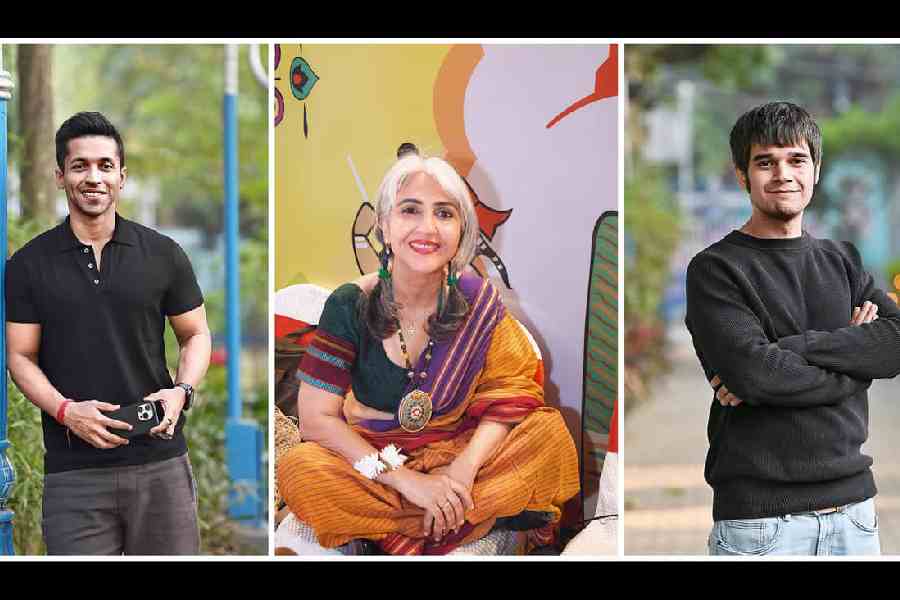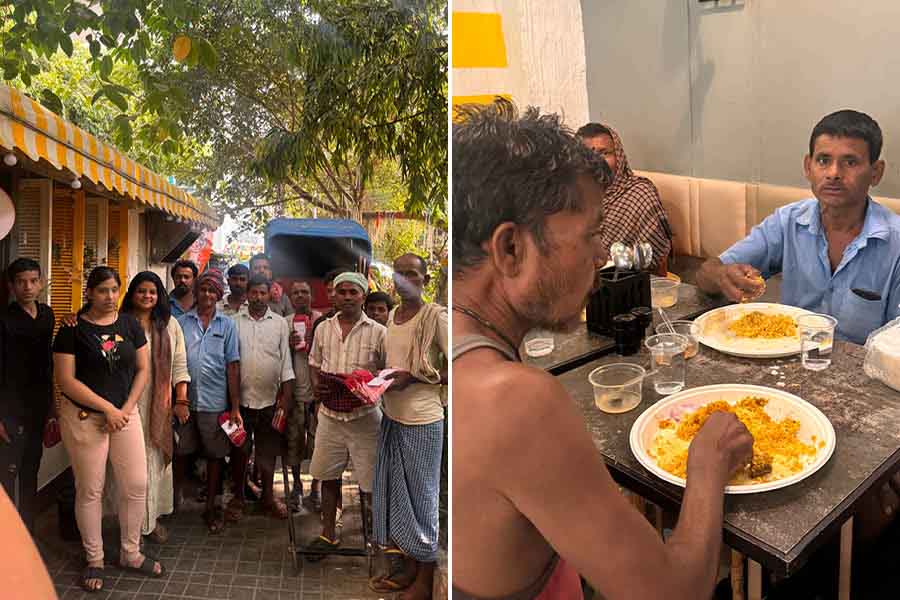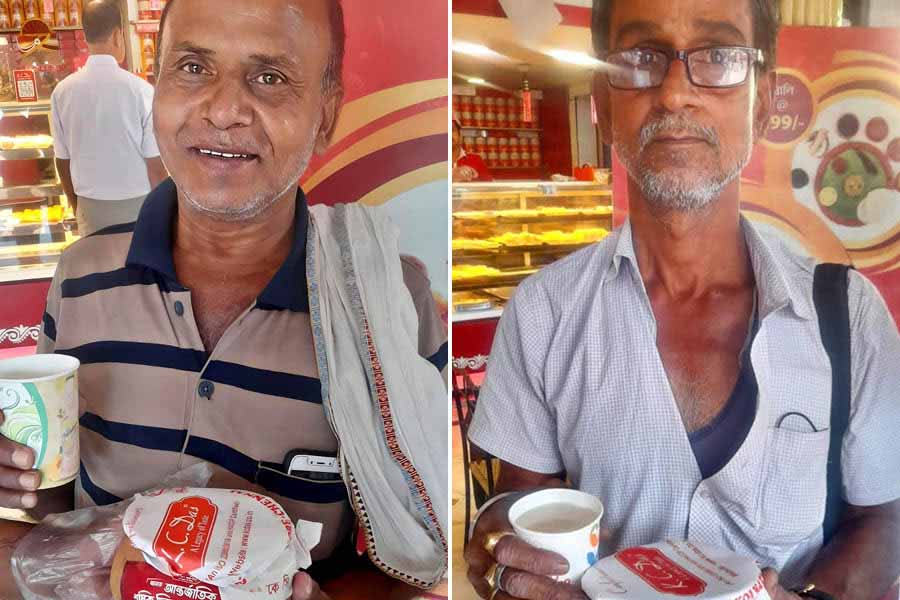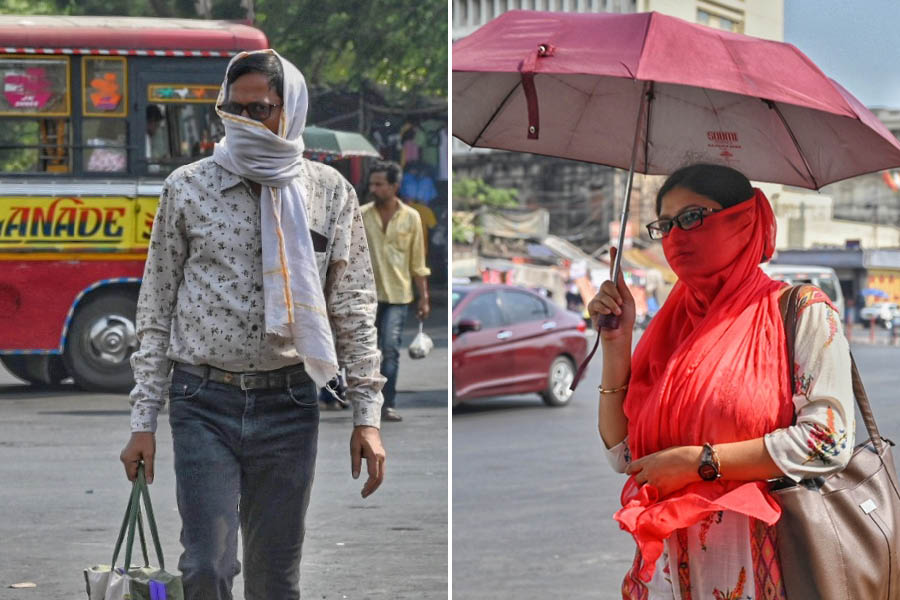Durjoy Datta, who shot to fame with his novel Of Course I Love You..! in 2008, has enjoyed success since his college days, when the book was first published. The author spoke to t2 after his eagerly awaited session at Allen Park on Park Street on the last day of the 15th Apeejay Kolkata Literary Festival. Excerpts from the chat:
Your novels revolve around themes of love and relationships. How do you approach creating relatable and authentic characters?
So, earlier when I was young, I used to get carried away. I’d obsess about throwing a wide net so everybody could relate to at least something about the character, but I have realised that that doesn’t work. In order to create an authentic character, their dreams, aspirations, fears, wounds, and backstories, it all needs to be logical and in place, and people will find some of it that resonates with them. So, I don’t obsess over what the reader is thinking anymore. I obsess over creating a character that’s complete, and feels like it’s a character that exists in real life. That’s how it’s been lately, and my books are really less about plot and more about characters now. That is what I stress on.
How would you say you approach character development?
I wrote the first six of my books before entering the world of television. And in television, what happens is that you have to have a definite end to a show and you have to know where exactly your characters’ journeys start and end. Because I haven’t formally studied writing — if I had, I would have known about the hero’s journey and whatnot — but because I haven’t studied it, and because I didn’t know the technicalities of it, I used to create my characters in an incomplete way so that they would find some part of their destiny at the end of the story. That came a little bit naturally to me. And it wasn’t a conscious choice to write like that, it just happened. And then of course I discovered that this is how people have always been writing stories! So, I was very validated. I was like, “Arrey wah, I know how to write a story! That’s great!”
Your books are known to connect with young adult readers. How do you stay in touch with the concerns and interests of the younger generation?
I read a lot. But the thing is, I have a fair idea where and what their concerns are, I don’t try to force it because that doesn’t work. It becomes very apparent when you pick up an issue just because it’s trending on the market or whatever. The second thing is that as I’ve grown older, my characters have also grown older. So, the conflicts that I now deal with are the conflicts of slightly older people. So, I don’t have to obsess about the problems of a 16-year-old.
How do you strike a balance between creating emotionally charged scenes and maintaining a sense of everyday realism in your storytelling?
I think I have to force myself to create a scene which is not real. Because whenever I write a scene, I’m in a zone where I feel it happening in front of me… it’s very easy for me to imagine that it is a scene that is happening with real people. But sometimes to make it dramatic, I have to do the opposite. I have to push an envelope and make it a little bit hyper-real so I can get more drama out of the scene, because, you know, a book is not about everyday life. A book is about hyper-normal situations in everyday life — otherwise you get a Sally Rooney book! Which is great, and that’s a different genre in itself, but that’s not my style. I like to create a little more drama. So, when I write a scene, I’m always thinking “What could be a more dramatic version of this?” I like to dial up rather than dial down, basically.
As someone who has collaborated with various authors, how does the collaborative process influence your storytelling?
See, the thing about collaboration is that I haven’t done it in a really long time. And I did it back then only because I wasn’t very confident with my own voice at the time. So, I needed someone else to come on board so that we could have a collaborative process and figure out what the book could be about. But now that I’ve grown older, I’ve become more confident about what I’m writing… plus I have a bigger ego now. So, I don’t think I can write another book with someone else because now I’m very sure about what I want from the characters and the stories.
Anuja Chauhan, whose 2021 book Club You to Death has been adapted into the Pankaj Tripathi-starrer Murder Mubarak streaming on Netflix from next month, dropped by Calcutta earlier this week for her sessions at the 15th Apeejay Kolkata Literary Festival. t2 caught up with the author for a chat about her thoughts on the film, her novel-writing practices, and what makes her stories tick.
ACP Bhawani Singh is finally out of the pages of your book! How does it feel?
It’s very exciting. The casting is great, and what’s funny is, when the book came out, so many people wrote to me saying that they were imagining Pankaj Tripathi in that very role! So it’s almost like he’s been manifested! Homi (Adajania) is a great director and I’ve seen the film, it’s looking great. So I’m very excited.
Coming to your novels, you seamlessly blend themes like romance and crime with humour and social commentary. What inspires you to combine these elements in your storytelling?
I’ve always been a thali person, you know. I want everything, like a good chaat mix! I’m very fussy. I want the aloo, the anda, the crunch, the softness, and I want everything nicely mixed. And this is in everything I do, not just the way I write. So, I think that is naturally the way I approach life. Even in my friendships, my work… I like having an eclectic mixture of people around me. Friends from different parts of the world, different parts of society, different age groups, as many genders as I can get. I get bored very quickly if I do one thing for a very long time. Even in the gym, I’ll do a bunch of things rather than just focus on one aspect. It’s kind of like a life philosophy. I’m obsessed with balance.
The thematic elements in your novels range from sports and politics to advertising. How do you decide on the themes for your books, and is there a particular theme or topic you’re eager to explore in future projects?
There are so many settings and scenarios that I want to explore. I’m a bit of a lazy researcher, honestly. I usually go for something that I’ve been watching for a while, or been immersed in for a while. And that’s usually something I find fascinating. So that’s what I write about. So, you know, cricket-based advertising was my job, and there wasn’t much I could do about it. I knew about it, and I enjoyed it, and I was exasperated with it, so it was a high-emotion relationship. A lot of love and hate mixed together. Similarly for politics, because that’s a big deal in the family I married into. Whether I liked it or not, I ended up doing a lot of campaigning.
And then later, I started choosing my themes — I took stuff that was already in my life and tried to make it bigger. The places I had access to, I thought, “Let me increase that access”. For example, the club books are primarily based on the Delhi Gymkhana Club, which is a place my husband’s family have been members of for a very long time. And I really got immersed into it because I thought it was a fascinating space. So, I pick themes that fascinate me and that I have access to. If it’s something I’m totally unfamiliar with, then I’d be very worried about writing it!
Even while writing The Zoya Factor, you know… it was set during the World Cup in Australia because my entire family lives in Australia and I have access to the place because I’ve lived there for a long time. So, it’s a natural instinct that comes to me. I really envy people who can set a book in a country they’ve never been to because they put in so much research. I also have access to a lot of things I don’t want to write about! But anything is an idea-starter, really. And getting access is one thing, of course, but then you have to work on it. You have to find out more and more and see what that opens up.
Your novels are known for their witty and colloquial language. How do you strike a balance between maintaining cultural authenticity in dialogue and making your books accessible to a diverse audience?
See, I’m a bit of a sucker for humour. Sometimes I’ll push things in my books, I’ll force stuff, I’ll move things around so I can get in that joke I desperately wanted to add. I do that a lot, even in life — I’ll put up with a lot of nonsense from people if they can make me laugh. It’s my number one criterion for people I surround myself with, ki please don’t bore me! But people aren’t always that funny in real life. So, when we’re talking authenticity, it’s very often at night that you stay awake and think “Arrey mujhe yeh bolna tha yaar, maine bola nahi. Reh gaya.” Toh woh main na kitaab mein daal deti hoon. So, in the books, I hone a little bit of that authenticity to make the humour shine. So, there’s a humour filter, you could say. I will use that filter to make things funnier than they really are. So that’s a bit of a cheat sheet. And sometimes I will use romance. So, something is nice, for example, and maybe I’ll shine it up a little. But otherwise, I try and be as authentic as possible.
The search is basically for reality, right? And this is how most of us speak in India, in a mix of languages. When it crosses a certain point, we reach for another language. So it’s all different. And we’re so lucky in this country, you know. Just think of those poor souls who only know one language!
As an author, you have a keen observational eye for the nuances of Indian society. How do you stay connected with the cultural pulse, and how important is it for you to reflect the evolving face of India in your work?
It’s very important. The key thing is that you must have enough free time. I have lots of free time. Which means if I want to immerse myself in something, I can. And I never refuse a chance to do that. We just have to stay open and spend time with people, and accept a few invitations that we might otherwise refuse because you never know, right? And I think if you keep your eyes open and you’re chatty and approachable, people will automatically gravitate towards you. To use a Calcutta word, people should know that there is potential for adda! Ki yaar baith jao, baat karte hain! It’s important to give out that vibe, I feel.
Your books feature very strong protagonists. How do you approach character development?
Look, everyone is grey. All of us are grey. All my hair is grey! We all have our finest impulses and our worst slides in character. Everyone is a mix, which is my favourite thing. I love mixes. People are like that, too. They’ll also have the darkest, meanest streaks and then points when they’re very independent and great. If someone is independent through and through then they’re bland. Kyunki aisa nahi hota, na. Everyone is a work in progress, right? So, everyone is allowed a character graph and everyone has one, unless you’re like half-dead, because I think the whole point of being alive is to get to a point where you can be the best you can possibly be. I feel characters change, they meet other people, they learn, they repent, or they come back and they get closure. Trying to reflect reality means allowing everyone a curve. There’s a very nice quote that goes “Every saint has a past, and every sinner has a future.”
As a former advertising professional, how has your background influenced your writing style and the way you approach creating narratives?
Like I said, I’m very lazy! I grab what I can. Thanks to my mother-in-law, I got interested in politics; thanks to my own job I wrote about cricket. Four sisters growing up in 80s India is my own life. Family property disputes are my own life. My childhood in the cantonments, and then the club culture I mentioned… my mother-in-law’s house was next door to the Delhi Gymkhana, so you could get drunk and walk home. And there was no question of being checked or anything, so we used to spend a lot of time in the club. So, it’s always stuff that goes on in my life or the people I know and friends that I have. Things I’ve got access to.
Are there specific rituals or habits you follow while writing?
When I’m writing, I write pretty much the whole day. I’m always writing, and the breaks are away from the writing. It’s like you wake up, pick up the laptop from where you kept it under your bed last night, and you start typing even before you brush your teeth. Earlier when my kids were younger, they would go to school, but now it’s even easier. Now I just feed the dog, go for Zumba, come back home, eat lunch, talk to the gardener… so that’s the place where it is.
Actor Vivaan Shah, whose third novel completes a year on the stands this spring, enchanted the audience with his literary inclinations for two very enlighting sessions at the 15th Apeejay Kolkata Literary Festival on Park Street. Excerpts from a t2 chat in which we talked about common favourite authors, how theatre influences Vivaan’s writing, and when we can expect his Ode to Edgar Allan Poe to hit the theatres in Calcutta.
Your third book The Forsaken Wilderness has turned a year old. How has the last year been?
It’s been really phenomenal, thank you. This was the first book of mine that was reviewed widely by the newspapers and that was a big thing. A real dream come true. I consider myself a student of literature, and I actively seek literary criticism. Some of the reviews… you know, I always felt like I knew a little bit about the genre in which I was dabbling, but it’s amazing that the reviews taught so much more about it. There was this one review in which the writer spoke about the whole tradition of the detective story. Mine isn’t a detective story, but it does have elements of suspense, investigation, solving a mystery. And I learned so much from the reviews that I got. So, I was very excited and really touched by that.
I was very scared when the book was coming out, too, because the style of the prose is very archaic. It almost alienates the reader and that was a deliberate choice, you could say. Because it was an experiment. It was to challenge the reader. Nowadays in contemporary literature, there’s a tendency towards minimalism. Shorter sentences. And I respect that a lot because it’s the translation of very complex thoughts into a few bare words. Its essence. But I was reaching in the opposite direction. I was practising what they call circumlocution. Saying it in as many words as possible. Which is what Poe did, what Conrad did. Their sentences used to trickle like a river. There was a rhythm and a musicality to their prose. And when I was performing Poe’s stories on stage 10 years ago, in a sense it made me understand and examine composition, rhythm and syntax. I started re-reading my favourite passages in the way someone would listen to their favourite song again and again and again. That was my MA in literature for me. I didn’t do an MA, I just did a BA, so performing Poe and Ambrose Bierce, and then Premchand and Chughtai taught me so much about literature and composition. And in both Hindi and English. So, I wanted to apply what I learned through that in my work.
Can you tell us about your journey into the world of writing? What inspired you to become an author?
I’ve been writing since I was a kid. Of course, at that age you write novels that you want to hide from the world later on, but I used to write short stories, a little bit of poetry… but I was primarily a playwright. I was primarily a screenwriter. And after several attempts of trying to either get a play or a film to materialise, after many disappointments, at the age of 24 I had an epiphanic realisation. I come from the world of theatre and to a certain extent films, and the medium of literature, the medium of prose, is the only medium apart from drawing in which all you need is a pen and a piece of paper. The canvas itself is resource-free. It’s not a resource-centric art form, unlike theatre and film. You don’t need to go out of your way to make the work materialise. To write the script or to write the play is half the battle won. The other half is making the work materialise, of course. And for that you need resources. People’s time, people’s money… in literature you don’t need any of that, and it’s so liberating. And that was the message I was trying to pass on to the younger people — do something that is realisable. Which you can make materialise. Even if you don’t get it published. Even if it just exists, it exists. And that’s half the battle won.
How has your background in acting influenced your approach to storytelling?
That’s a very nice question, thank you so much for asking. Art can be very interconnected, you know, and that is what propelled me on this path of being a novelist. I directed this play in 2015 called Comedy of Horrors, with Shiv Subramaniam, who I also dedicated it to — he passed away sadly — and we did Poe’s short stories for that one. And that was my MA in literature. Working with these guys, trying to figure out how to dramatise the prose, how to speak that prose eloquently… that made me understand meter, rhythm, syntax. So, I owe my being a novelist to theatre. And that’s why I dedicated my play to Shiv, because if it hadn’t been for that play, I would not have discovered this part of me. Without theatre I wouldn’t be writing at all.
Can you share any upcoming projects that readers can look forward to?
Yeah, so my next book is a bit of a departure, actually. It doesn’t have as much of a genre base as the first three. For the first three, I could point out to you the blueprints on which I’d built them. But the fourth one is a little more difficult to classify in terms of genre, although the suspense-mystery elements are still there. But it’s a very different kind of story, and it’s closer to Earth. Closer to real life. I still hope it’s slightly alien, though, but it’s a bit more terrestrial! (Laughs) But it’s a departure for sure.
Do you have plans to explore different genres or themes in your future writing projects?
Yes. I’ve always dreamt of writing a heist novel. In fact, in my second book, there are elements of the heist, but I’ve always wanted to write a proper, solid heist novel… also, my fourth novel, the one I just mentioned, is more female-oriented. The first three were very male-centric, so I’m making a conscious effort to evolve, to try and explore a different world and different sensibilities.






